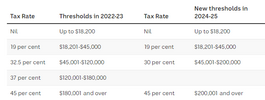mcnulty
Norm Smith Medallist
- Sep 18, 2019
- 6,374
- 9,383
- AFL Club
- Hawthorn
- Banned
- #176
Ah, so we can throw small business owners into the category of people who don’t know what’s good for them.Oddly enough, whilst this is true, things like increasing wages is likely to have a flow-on benefit for many small businesses.
Giving corporate tax breaks, or tax breaks for high income earners doesn't really result in an increase in discretionary spending.
What we saw during Covid with the increased welfare payment was that low income earners basically spent whatever they got because it meant they could service needs. Instead of little Fred wearing an old beaten up pair of school shoes again this year, he could get a new pair, that type of stuff. If you give more money to already wealthy people they're unlikely to actually do anything with it.
My guess is that a lot of 'progressive' economic policy would likely benefit small business more than the conservative pet options of lowering corporate taxes and high tax brackets that really only impact those who are already very wealthy.





